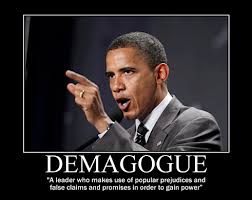记忆方法
记忆“demagogue”可以通过以下方法:
将“demagogue”拆分为两部分:“demo”和“gogue”。记住“demo”可以联想到民主(democracy)或民众(the demos),而“gogue”可以想象成一个人在人群中进行操纵性的演讲。将这两个部分结合起来,可以想象一个利用民众情绪、进行煽动的演讲者,这就是“demagogue”,即煽动民情的政客。
将“demagogue”拆分为两部分:“demo”和“gogue”。记住“demo”可以联想到民主(democracy)或民众(the demos),而“gogue”可以想象成一个人在人群中进行操纵性的演讲。将这两个部分结合起来,可以想象一个利用民众情绪、进行煽动的演讲者,这就是“demagogue”,即煽动民情的政客。
以上内容由AI生成, 仅供参考和借鉴
中文词源
demagogue 蛊惑民心的政客
dema-, 人民,见demotic.-agoga, 做,领导,词源同agent. 词义贬义化,用来指暴民的领导者,蛊惑民心的政客。
英语词源
- demagogue
-
demagogue: [17] A demagogue is literally a ‘leader of the people’. The word represents Greek demagōgós, a compound formed from demos ‘common people’ and agōgós ‘leader’. (This was derived from ágein ‘drive, lead’, a verb related to Latin agere ‘do’, and hence to its host of English descendants, from act to prodigal.) In ancient Greece the term was applied particularly to a set of unofficial leaders drawn from the common people who controlled the government of Athens in the 4th century BC, and whose irresponsible rule (as their critics saw it) has given demagogue a bad name ever since.
=> act, agent - demagogue (n.)
- 1640s, from Greek demagogos "popular leader," also "leader of the mob," from demos "people" (see demotic) + agogos "leader," from agein "to lead" (see act (n.)). Often a term of disparagement since the time of its first use, in Athens, 5c. B.C.E. Form perhaps influenced by French demagogue (mid-14c.).
- demagogue (v.)
- by 1964, American English, from demagogue (n.). Related: Demagogued; demagoguing.
权威例句
- 1. The demagogue has won people's support.
- 那个煽动者赢得了人们的支持。
- 2. They labelled him as a demagogue.
- 他们说他是煽动家.
- 3. Li Yang is a demagogue, to say the least.
- 一言以蔽之,李阳至少是一个煽动家.
- 4. They labeled him a demagogue.
- 他们称他为政治煽动家.
- 5. I don't want to demagogue my talk.
- 我不想把话夸大.
